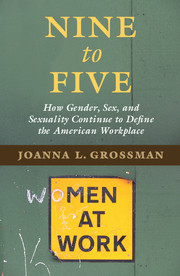Book contents
- Frontmatter
- Dedication
- Contents
- Foreword
- Acknowledgments
- Introduction
- PART I WHAT IS SEX DISCRIMINATION?
- PART II SEXUAL HARASSMENT
- PART III PREGNANT WOMEN AND MOTHERS AT WORK
- PART IV FEMALE BREADWINNERS AND THE GLASS CEILING
- 47 The Supreme Court Slams the Door on Pay Discrimination Claims
- 48 A Call for Congressional Action to Remedy Pay Inequality
- 49 The Lilly Ledbetter Fair Pay Act of 2009
- 50 Taking Stock: Is the Ledbetter Act Working?
- 51 The Lady in Red
- 52 Unfinished Business
- 53 Will ABA's Proposed Solutions for Gender Inequity Work?
- 54 Equality Still Elusive for Women in the Federal Workforce
- 55 “Girlie Men”
- 56 Playing “Too Womany” and the Problem of Masculinity in Sport
- 57 Binders for Women, Blinders for Romney
- Conclusion
- Notes
- Index
47 - The Supreme Court Slams the Door on Pay Discrimination Claims
from PART IV - FEMALE BREADWINNERS AND THE GLASS CEILING
Published online by Cambridge University Press: 05 May 2016
- Frontmatter
- Dedication
- Contents
- Foreword
- Acknowledgments
- Introduction
- PART I WHAT IS SEX DISCRIMINATION?
- PART II SEXUAL HARASSMENT
- PART III PREGNANT WOMEN AND MOTHERS AT WORK
- PART IV FEMALE BREADWINNERS AND THE GLASS CEILING
- 47 The Supreme Court Slams the Door on Pay Discrimination Claims
- 48 A Call for Congressional Action to Remedy Pay Inequality
- 49 The Lilly Ledbetter Fair Pay Act of 2009
- 50 Taking Stock: Is the Ledbetter Act Working?
- 51 The Lady in Red
- 52 Unfinished Business
- 53 Will ABA's Proposed Solutions for Gender Inequity Work?
- 54 Equality Still Elusive for Women in the Federal Workforce
- 55 “Girlie Men”
- 56 Playing “Too Womany” and the Problem of Masculinity in Sport
- 57 Binders for Women, Blinders for Romney
- Conclusion
- Notes
- Index
Summary
The Supreme Court issued a 5–4 decision in Ledbetter v. Goodyear Tire & Rubber Co. that will be devastating for plaintiffs who have suffered pay discrimination and seek to sue under Title VII, the main federal anti-employment-discrimination statute. It interpreted the statute of limitations in a way that will make it difficult, if not impossible, for women to challenge pay discrimination, an intractable problem, effectively. Unless Title VII is robustly enforced, that discrimination will persist. But the Supreme Court has just erected a substantial obstacle to enforcement.
THE FACTS AND THE RULINGS BELOW
Lilly Ledbetter worked as a production supervisor at Goodyear Tire & Rubber's plant in Gadsden, Alabama. She took early retirement in 1998, nearly twenty years after she began working for the company and after being transferred against her will to a less desirable job on the production floor. Ledbetter filed a charge of discrimination in 1998 with the EEOC, alleging various forms of sex discrimination.
At trial, Ledbetter proved to the jury that she had suffered illegal pay discrimination. She was paid less than the lowest-paid male in the same job – so much less that her salary sometimes fell below the minimum salary set by the company's pay policy for her position. Goodyear did not dispute the pay disparity, but it argued (unsuccessfully) that it resulted from her consistently poor performance, which, it claimed, dictated her unusually small or absent annual pay raises. Ledbetter offered evidence that performance evaluations were falsified; that she received a “Top Performance Award” one year; that the company's policy with respect to pay raises was not followed; that there was widespread discrimination against female managers at the plant; and that plant officials bore discriminatory animus against female employees. On this record, the jury awarded Ledbetter $223,776 in back pay and more than $3 million dollars in punitive damages. (This award was reduced by the court to $300,000, however, because Title VII limits total damages to $300,000 for claims against employers of this size – a cap that was set when the law first provided for money damages in 1991.)
On appeal, the employer, Goodyear, claimed that Ledbetter was entitled to nothing because her lawsuit was filed much too late.
- Type
- Chapter
- Information
- Nine to FiveHow Gender, Sex, and Sexuality Continue to Define the American Workplace, pp. 277 - 284Publisher: Cambridge University PressPrint publication year: 2016



